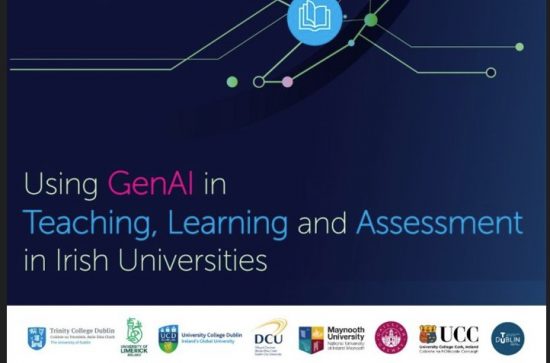
We are pleased to announce the Open Publication of “Using GenAI in Teaching, Learning and Assessment in Irish Universities”, edited by Dr Ana Elena Schalk Quintanar and Dr Pauline Rooney.
The publication was co-edited by representatives from each University, including Lisa O’Regan, Head of the Centre for Teaching and Learning at Maynooth University.
This publication aims to promote AI literacy, inspire new teaching, learning and assessment approaches, and spark innovation across disciplines. It includes over 30 use cases from across seven Irish Universities, which provide a valuable insight into how educators are responding to the challenges and taking advantage of the affordances of GenAI across a wide range of disciplines.
Maynooth University educators contributed four articles to this open publication.
Dr Shane McLoughlin, School of Business, ‘Navigating Paths of Resistance: Tight-roping GenAI’s role in Continuous Assessment Design’. Dr McLoughlin’s study looked at how to bridge education with practice and ensure academic integrity with a “living lab” approach, involving 736 students conducting case studies to explore the impact of new digital technologies on Irish companies. The students were required to critically appraise a GenAI tool’s effectiveness in assisting with this task, discovering in many instances that added efforts were need on their part to verify GenAI responses. The study highlighted the need for more effective assessment design to manage ‘the path of least resistance’.
Dr Simon Hewitt, Media Studies, ‘Improving Visual Engagement Through Generative AI in Media Studies’. Dr Hewitt’s showcase focused on the use of GenAI to support visual engagement strategies, in the Media Studies first year cohort of students, and the Critical and Creative Media MA, along with further implementation in a postgraduate methods class. Dr Hewitt reinforced and promoted ethical GenAI use in each lecture. The incorporation of a new approach in each class gained overwhelmingly positive feedback from students, leading to increased engagement with the core material.
Dr Adrian Kirwan, Critical Skills, ‘GenAI Dispositions and Literacies: Podcasting as praxis Writing in Media’. Dr Kirwan’s showcase examined the potential of GenAI as a writing technology in a module focused on writing as a rhetorical practice. Students learned how to critically evaluate the use of GenAI in their writing, learning about the affordances and limitations inherent in GenAI, learning how to think critically about the ethical and legal dimensions of GenAI use, and when it is more appropriate not to use GenAI, and how time-consuming it was to produce usable text.
Prof Rebecca Chiyoko King-O’Riain, Sociology, ‘Is GenAI Reproducing or Helping to Solve Social Inequality?’ Professor King-O’Riain employed GenAI as part of a second-year Sociology module on Structures of Inequality, Race, Class and Gender. AI was conceptualised as a social structure that shapes social interactions and embodies social identities and meanings. Students had to critically evaluate the social inequalities within GenAI when used in their learning. Students learned how pervasive GenAI is in the modern world and how biased it is, previously having assumed that it was a neutral technology.
The publication is available here: https://ucclibrary.pressbooks.pub/genai/
